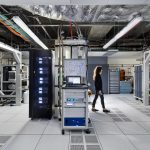Call for National Research and Development Program Focusing on QIS in Pakistan

(ExpressTribune) Yarjan Abdul Samad, a Senior Research Scientist & Senior Teaching Fellow at the University of Cambridge, UK is the author of an editorial summarized here by IQT-News that calls for the establishment of a Quantum Information Science R&D program in Pakistan. He points out that in the race to advance QIS, developing countries are not an exception as many of them are pushing hard to build collaborations with leading Western, and Asian technology experts. For example, some developing countries such as India and to an extent Bangladesh have started active collaborations on QIS technology with material science, and electrical engineering departments of the University of Cambridge in UK.
Samad writes: I along with several others who want to see Pakistan become a technologically advanced country would be happier and more content if some of the education budget’s funds are utilised to develop a national research programme. The main aim for such a programme would be to lay the foundation for a thriving knowledge based national economy.
It is high time that a national research and development programme focusing on QIS is started in Pakistan which would involve the country’s leading universities, relevant private sector companies, and the budding technology focused start-ups. Through such a programme, we could also sign collaboration agreements with the prominent global universities and organisations working within this space. I suggest the following key aspects of QIS to be included in the programme:
1) Micro & Nano Fabrication of Quantum devices
2) Quantum Communication and Quantum Control Systems
3) Quantum Metrology, Sensing & Imaging including for space technologies
4) Quantum Networks, among others
Both local Pakistani QIS experts, as well as those working abroad, can be utilised to help advise on detailed work packages with distinct short, medium and long-term goals for each of the aforementioned aspects of QIS. This programme, if developed, should be done with swift timelines, challenging but realistic deliverables, and key performance indicators. I have no doubt, that if we bring together the intellectual wealth that we collectively possess as a nation, we will be able to advance rapidly within this new area of quantum technology.
The least that can be achieved with a national programme for QIS is short and long term improvements in rankings of Pakistani universities, reinforced industry-academia collaborations and better skilled academics and graduates. And the ideal scenario would be a knowledge-based economy capable of building future technologies at home rather than being just a consumer nation.


















